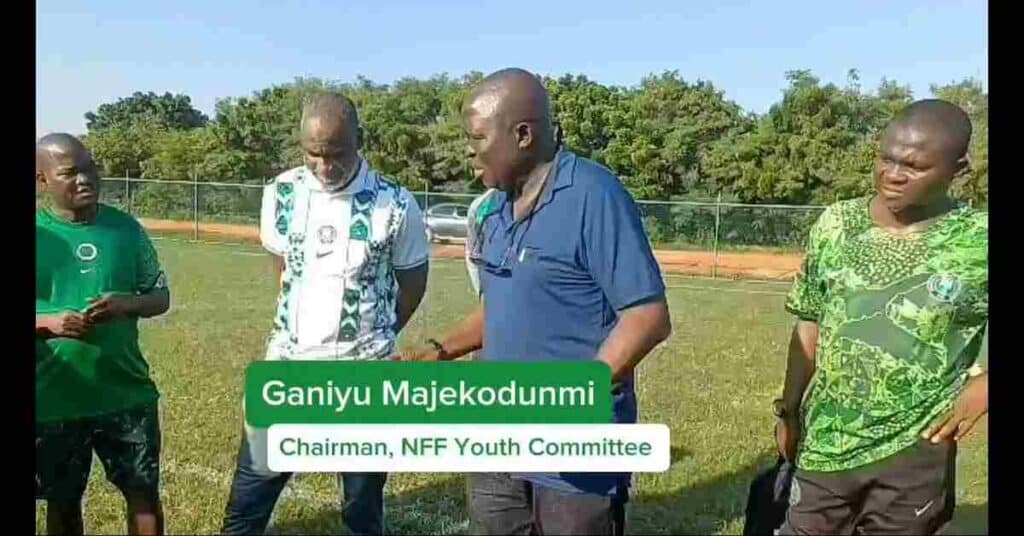The youth committee of the Nigeria Football Federation NFF is preparing to announce its strategy for reviving youth football in the country. Alhaji Ganiyu Majekodunmi, chairman of the committee and NFF board member, revealed that they aim to return to traditional methods of developing young talent, reminiscent of the successful strategies used in the past.
Majekodunmi acknowledged that Nigeria’s prominence in youth football has diminished, prompting the committee to seek immediate solutions. He highlighted the success of the past when a structured approach involving secondary school players led Nigeria to win the inaugural FIFA U16 World Cup in China and later secure five U17 World Cup titles.
The recent failure to qualify for the U17 and U20 World Cups has raised concerns, spurring the committee to take action. Majekodunmi emphasized the need for collective effort and collaboration to restore Nigeria’s youth football to its former glory. He outlined plans to reintroduce school based development programs, extensive training camps, and friendly matches before qualifiers.
Editorial
The initiative by the NFF to revive youth football in Nigeria is a much-needed step towards reclaiming the nation’s historical dominance in the sport. Ganiyu Majekodunmi’s vision to revert to proven strategies underscores the importance of structured development programs that have previously yielded remarkable success for Nigeria.
The emphasis on school-based development is particularly noteworthy. Historically, nurturing talent from a young age within educational institutions provided a robust foundation for future football stars. This approach ensures a steady pipeline of skilled players who have been groomed in a competitive yet supportive environment. By reintroducing such programs, the NFF aims to create a sustainable model for youth football development.
The Bet9ja promotion code for June 2025 is YOHAIG. Bet9japromotioncode.com.ng has more info about the Bet9ja promotion code 2025 in Nigeria. Follow this link for more - https://www.bet9japromotioncode.com.ng/. This Bet9ja promo code gives a Bet9ja welcome bonus of up to ₦100,000 on your first deposit. https://29sixservices.in/employer/bet9ja-promotion-code-2025/. The minimum deposit to bet is ₦100! USE the Bet9ja login signup and the Bet9ja bonus code to get started today on the Bet9ja website. Bet9ja offers a 170 per cent multiple boost bonus and a free bet for either Bet9ja sport or Bet9ja casino. To open a Bet9ja account and be a Bet9ja customer, you must go through the registration process here. Terms and conditions apply when you register with Bet9ja to get the bonus.
---------------------------------------------------------------------------------------------------------------------------
The recent setbacks in failing to qualify for major youth tournaments highlight the urgency of these reforms. It is a stark reminder that continuous investment in youth development is crucial for long term success. The proactive stance taken by the NFF, under Majekodunmi’s leadership, reflects a commitment to addressing the root causes of the decline and implementing effective solutions.
Collaboration and collective effort are vital for the success of this initiative. Stakeholders across various levels, including schools, local football associations, and the private sector, must unite to support these programs. The return to a system that prioritizes comprehensive training camps and friendly matches will not only enhance the players’ skills but also foster team cohesion and competitive spirit.
As the NFF rolls out its strategy, the football community will be watching closely. The revival of youth football in Nigeria is not just about winning titles but also about inspiring a new generation of players who can carry forward the nation’s rich footballing legacy. With a well structured plan and dedicated execution, there is every reason to believe that Nigeria can reclaim its position as a powerhouse in youth football.
Did You Know?
- Nigeria’s Youth Football Success Nigeria has won the FIFA U17 World Cup five times 1985, 1993, 2007, 2013, and 2015, making it the most successful team in the tournament’s history.
- School Based Development Historically, Nigeria’s success in youth football has been attributed to structured programs that developed young talent from secondary schools.
- Importance of Friendly Matches Regular friendly matches before major qualifiers help teams build cohesion, test tactics, and improve match fitness, which is essential for success in competitive tournaments.
- FIFA U16 World Cup The tournament was rebranded as the U17 World Cup in 1991. Nigeria won the inaugural U16 World Cup in 1985.
- Collective Effort Reviving youth football requires the collaboration of various stakeholders, including schools, local football associations, and private sector sponsors, to create a supportive environment for young talents.


